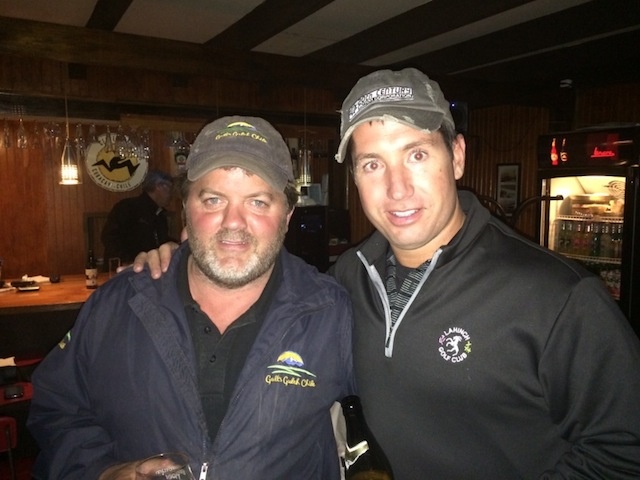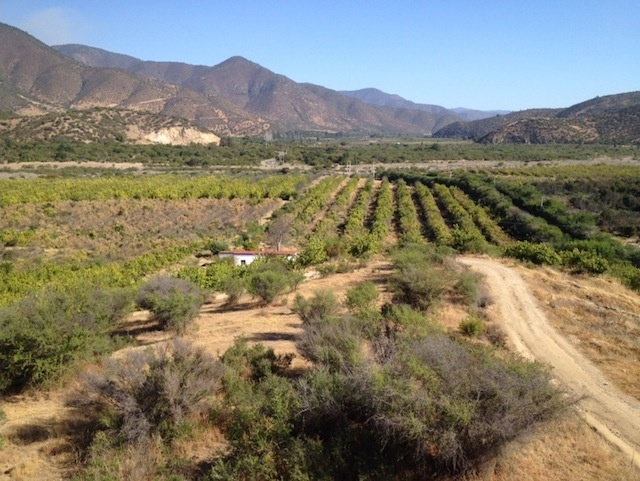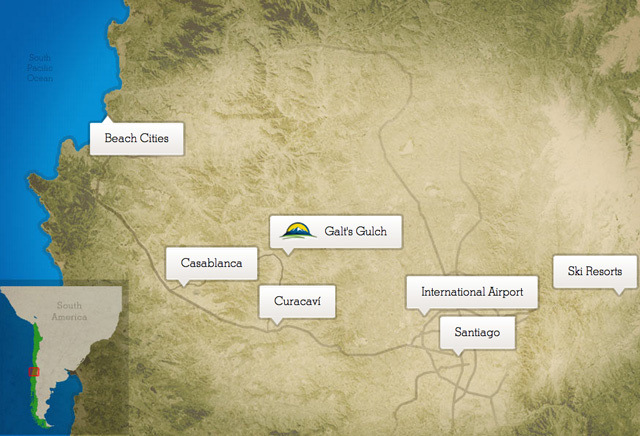It was a good idea, in theory anyway. The plan was to form a sustainable community made up of people who believed in capitalism, limited government, and self-reliance. The site was already picked out: 11,000 acres of fertile land nestled in the valleys of the Chilean Andes, just an hour’s drive away from the capital of Santiago, to the east, and the Pacific Ocean, to the west. Residents could make money growing and exporting organic produce while enjoying Chile’s low taxes and temperate climate. This was no crackpot scheme to establish a micronation on a platform floating in the middle of the ocean (a common libertarian dream)—this was a serious attempt to build a refuge where free marketers and anarcho-capitalists could hole up and wait for the world’s fiat currencies to collapse. They called it “Galt’s Gulch Chile” (GGC), naming it for the fictional place where the world’s competent capitalists flee to in Ayn Rand’s Atlas Shrugged.
The project was conceived in 2012 by four men: John Cobin, an American expat living in Chile who once ran unsuccessfully for Congress in South Carolina; Jeff Berwick, the globe-trotting founder of the Dollar Vigilante, a financial newsletter that preaches the coming end of the current monetary system; Cobin’s Chilean partner; and Ken Johnson, a roving entrepreneur whose previous investment projects included real estate, wind turbines, and “water ionizers,” pseudoscientific gizmos that are advertised as being able to slow aging.
Videos by VICE
That initial group quickly fell apart, though today the principals disagree on why. Now, two years after its founding, the would-be paradise is ensnared in a set of personal conflicts, mainly centered on Johnson. Instead of living in a picturesque valley selling Galt’s Gulch–branded juice, the libertarian founders are accusing one another of being drunks, liars, and sociopaths. GGC’s would-be inhabitants have called Johnson a “weirdo,” a “pathological liar,” “insane,” a “scammer,” and other, similar things. Some shareholders are pursuing legal action in an effort to remove him from the project, a drastic measure for antigovernment types to take. Johnson, who remains the manager of the trust that controls the land, claims all the allegations against him are false. So what happened?
Like most prospective utopias, Galt’s Gulch Chile started out on a positive note, at least after Berwick and Johnson broke from Cobin. Johnson was a savvy salesman, and it turned out that the somewhat apocalyptically minded people who read Berwick’s newsletter were intensely interested in the prospect of a South American sanctuary. For those who think that Western nations are turning into the world of Atlas Shrugged—dominated by parasitic governments, hostile to innovation and job creation, and on the verge of totalitarian socialism—GGC looked pretty good.
“We are very happy to offer the respite from the Western world of oppressive governments to freedom-minded people in which they can build a new, more prosperous community,” Berwick wrote in May 2013. Wendy McElroy, a Canadian libertarian feminist activist and writer who bought a lot on GGC, followed that up with her own blog post that said, “It is now time for a libertarian exodus that will not take you away from your true home, but toward it.” Johnson wrote about “sitting under the stars, inhaling the fresh air and sipping on some Yerba Mate, made with fresh clean Galt’s Gulchwater.” Discounts were offered to those willing to pay in Bitcoin or precious metals.
People bought it, and bought into it. In November 2013, GGC hosted a celebration on the property, bringing in shareholders, and those interested in becoming shareholders, to view the land and meet one another. Josh Kirley, a commodities trader who was considering making an investment, was impressed by the quality of his potential neighbors.
“These were people who had made money in oil, had made money in real estate. They were former academics, former military. They were very liberty-minded people: non-litigious, hard-working, self-made, intelligent,” he told me. “It was the people I met there that sold it to me.”
After paying attorneys and investigators to perform a background check on Johnson and make sure GGC held the title to the land, Kirley bought land in the Gulch that included a 25-acre lemon farm for $200,000, and he gave the project an $800,000 interest-free loan. He wasn’t the only one putting down serious money: In December 2013 the Economist published a mostly positive write-up of GGC that claimed Johnson had brought in $1.5 million in sales in Bitcoin alone.
Earlier this year, however, it became apparent that something was wrong. In April, another event was held in the Gulch, this time, supposedly, so some buyers could pick out the lots where they would live. This wasn’t possible, however—the land wasn’t zoned for the 1.25-acre lots that Johnson had sold to many investors. The plan was to rezone the property, but that hadn’t happened yet. In addition, according to Kirley, a number of houses that were supposed to have been built were unfinished.
“You could just sense something was amiss,” said Kirley. A question-and-answer session for investors got rescheduled, and when his guests confronted Johnson about the problems with GGC, “he just told these ridiculous stories about all these enemies of the project and how Jeff Berwick was an enemy of the project, which made no sense.”
The investors took to the internet with their doubts about Johnson a few months later. McElroy, the Canadian activist, published a blog post on August 25 alleging that GGC owed “immense debts” to Chilean vendors and that she had been sold a lot that she couldn’t live on because of the zoning issues. Days later, Berwick published his own account of events on his website.
Berwick had apparently come to Johnson several times in 2013 with complaints about the project—he was worried they were selling lots before GGC had paid for the land, and that the property wasn’t zoned for the residential properties the company was handing out. But Johnson convinced him that his fears were unfounded, and none of those conflicts became public. Berwick said they had another fight when he found out that Johnson had transferred control of the land from a company the two of them had owned jointly into a trust that Johnson controlled. (The former partners also have a number of disagreements about non-GGC-related business, and each complains that the other has cheated him in various ways.)
Berwick, Kirley, McElroy, and others involved with GGC have accused Johnson of not paying his staff or vendors, of physically assaulting an employee, and of not delivering on his promises to get the land rezoned so people could live on it. They claim that Johnson traveled around with $250,000 of the investors’ money in cash, which he kept in a backpack he’d sometimes leave in his jeep; that he drank in bars and gambled on roulette with their money; that he fed his dog imported salmon; that he may have been involved with scams to sell phony passports; and that he still refuses to disclose the full list of investors in the project. Kirley says that he and 11 other major investors are owed, collectively, more than $4.3 million, and the group is now filing an injunction in Chilean court in an effort to wrest control of the Gulch from Johnson. They still believe in that original vision; they just don’t think it can work unless they replace the man at the top.

There are a few problems in trying to untangle what happened to GGC. One is that it appears that no one besides Johnson knows how many people have bought lots on the Gulch (he says there are around 50) or how much money has been invested in the project overall. Another problem is that Johnson’s account of events contradicts those of the disgruntled shareholders at every turn—to hear him tell it, the people calling him names are looking for money or fame or seeking to destroy him personally.
Last week I spoke to Johnson, who still lives and works in the Gulch, over the phone. According to him the company has “nine or ten” full-time employees, along with contractors making improvements on the land and working on the farm. He’s not making any new sales at the moment—in fact, he says, he’s offering refunds to disgruntled investors.
In Johnson’s version of events, nearly everyone involved with GGC was a liar or didn’t deliver on promises they had made. “There’ve been some interesting characters come and go at Galt’s Gulch,” he told me with a chuckle. “It’s been a strange project, to say the least.”
So what about all the allegations against him: the unpaid workers and vendors, the man he supposedly assaulted, and so on? Johnson told me there are three former employees who claim they’re owed something, but he said that in two of the cases they had taken company property and in fact owe Johnson money. There are only “two or three invoices” that haven’t been paid, he insists. The guy who said Johnson attacked him actually fell over a duffel bag when the two of them “had some words.”
As for Berwick, Johnson insinuated that his former partner has a drinking problem, has suffered from various recent business failures, and as a result has “turned his anger and paranoia toward me.” He said Berwick knew all along that the two of them weren’t 50-50 partners in the company that operates GGC. Johnson added, “It’s been a long, repetitive history of Jeff making a lot of threats against me and being very defamatory toward me.”
Johnson told me he has been trying to get the Gulch rezoned so that people can live on it, but said that these efforts were stymied by people who betrayed his trust, chief among them Adolfo Aguirre, a Chilean who was hired as GGC’s environmental planner in 2013 and left the company earlier this year. He says Aguirre promised that he could have the property divided into 450 lots by 2014, and that they even submitted a proposal to the government several months ago, but nothing came of it because of Aguirre’s lies. Johnson told me that his former employee hates Americans and was “actually working to make our approvals more difficult”; he also said Aguirre was investigated by police after a GGC employee accused him of stealing documents from the company.
(By email, Aguirre said the case against him was thrown out and that Johnson was a “swindler” and a “fuckup” who kept his buyers in the dark about the project, habitually abused his employees, and was driving GGC into the ground with his poor management.)
Johnson claims he just wants the Gulch to get up and running—he’s hopeful that one of several needed rezonings will get approved by the end of the month—and is happy to hand off the management of GGC to others if they want to take it over.
“If me staying is the best thing, great,” he said. “There are some people that don’t want me involved, and I can live with that. I can go on to other things with my life. I just want to look back and see Galt’s Gulch succeed… There’s been no schemes to take money whatsoever.”

Even now, everyone I spoke to who had been involved in Galt’s Gulch Chile said they want to see the original idea come to fruition.
“Almost all the investors, buyers, and myself are incredibly passionate about making this work and we are doing everything possible to do so,” Berwick wrote in an email.”There is only one person who stands in the way of any chance of GGC’s potential success and that is [Johnson].”
Berwick is sticking to his libertarian principals and not taking part in any legal action against his former partner. He’s resigned to taking a heavy loss in this affair, but he can evidently afford to do so. Kirley says there are people who have sunk their life savings into buying land in the Gulch, and he’s determined to make sure all the investors get the land they paid for.
The commodities trader, who is perhaps less of an anti-statist, has retained two Chilean law firms and intends to use the courts to force Johnson to give up control of GGC, after which the investors could attempt to work out the zoning issues and eventually live on the land, finally establishing their long-sought Randian paradise. According to him, Johnson asked for $5 million in exchange for handing over control of GGC, but Kirley balked at the price. When I tried to confirm this account with Johnson, he said only, “There’s been different talks.”
Johnson’s position is that he has given Kirley all the documents that he’s asked for (“That is a lie,” said Kirley by email), and that he’s ready to step down; he just wants Kirley to come down to Chile to sort things out. (“I’m not going to hang around in Chile while he continues to stall,” Kirley said. “Negotiations can be done over Skype or email… I will return [to Chile] once he has turned over control.”)
The most recent point of contention is the water rights owned by GGC. In Chile, water and mineral rights can be sold independently of land, and one of the project’s most important assets is the water under the ground that it controls. Johnson is currently selling off some of these water rights to raise capital and provide refunds to shareholders, a move that the already unhappy investors oppose. They say that it’s shortsighted to sell the water outright and that Johnson hasn’t even finished paying for the asset he’s trying to sell. Kirley pointed to this as another example of the man’s shady business practices.
“He said he owned the water rights, said they were so valuable that we could lease off the extra flow. In actuality, he never made the payments and still owes nearly [$2 million] before we own the water rights. Now he is working with the seller to sell those water rights for less than he told us we would be leasing them for,” wrote Kirley in an email.
“Gotta admit, the guy has balls.”

If you believe Johnson, GGC’s difficulties can be chalked up mostly to the project’s incredible run of bad luck—his original partners were mentally unstable liars, and the Chileans he worked with were all too eager to take advantage of an American who was perhaps in over his head running an operation of that magnitude and complexity in a foreign country.
A less charitable view is that the Gulch was a scam from the beginning and Johnson has simply been taking in as much money from starry-eyed libertarians as he could without keeping much in the way of records or seriously trying to make their vision a reality. Some of those involved in GGC share a version of this opinion, and a couple founders say now that Johnson only pretended to believe in libertarian philosophy—Berwick claimed in an email that Johnson told him he “hates anarchists and libertarians.”
You could also, if you were so politically inclined, see GGC’s failure as an indictment of the libertarian principles that Gulchers hold so dear. “Unregulated capitalism… is presenting some problems!” is how a gleeful, schadenfreude-filled Gawker blog post summed up the mess. And it may be true that some of the founders’ aversion to government-run legal systems and reliance on handshake agreements hurt them—Berwick’s assumption that he owned half of the company with Johnson, though he apparently didn’t have documents that stated as much, seems oddly naïve in hindsight.
Libertarians are normally wary of governments and other large organizations, but in this case they seem to have been too trusting of the idea of the Gulch in general and Johnson in particular. There’s nothing uniquely libertarian about putting faith in people who say they share your beliefs, or about wanting to build a utopia far from the grubby reality of your current home—but the idea that you can buy your way into paradise seems tailor-made for that political tribe. Looking back, it seems the problem was that the Gulchers weren’t as skeptical of the scheme as they should have been simply because it was spun by their ideological allies.
“A con of this magnitude could only have existed in the libertarian community because [Johnson] used their paranoia and distrust of the government to say, ‘Put everything in a trust, I won’t tell anybody who you are, don’t let anyone find out you’re investing, and I prefer you use precious metal or Bitcoins so it can’t be traced,’” Kirley said. “It really worked out well, whether it was intentional or just the perfect storm.”
Follow Harry Cheadle on Twitter.
More
From VICE
-

Gerenme/Getty Images -

Angus Mordant/Bloomberg via Getty Images -

Screenshot: Shaun Cichacki -

Screenshot: Bethesda Softworks
